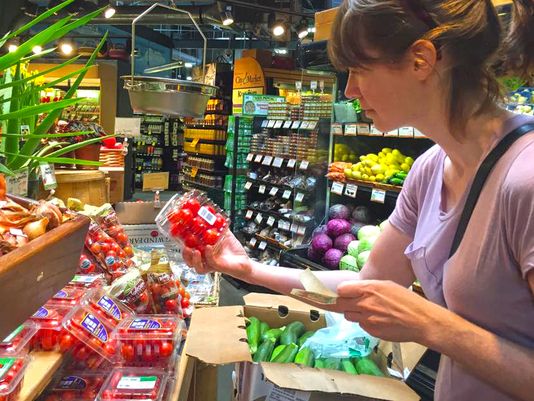
Vermont Businesses Ride GMO-Free ‘Megatrend’
After a long scan of the organic-vegetable cooler, Penelope Wall added several items to her cart.
"Oh my gosh!" Wall said. "I'm about to spend $5 on a bag of baby cucumbers."
She pinched one of the bright green gherkins and added, "But they look really crunchy and I'm excited to eat one."
June 1, 2015 | Source: Burlington Free Press | by Emilie Teresa Stigliani
After a long scan of the organic-vegetable cooler, Penelope Wall added several items to her cart.
“Oh my gosh!” Wall said. “I’m about to spend $5 on a bag of baby cucumbers.”
She pinched one of the bright green gherkins and added, “But they look really crunchy and I’m excited to eat one.”
Wall picked her way through City Market’s eclectic-but-lightly-stocked produce section on a Sunday afternoon in May. The Burlington mother of two toddlers, who were napping at home, said she tries to shop organic and local. Her reasons include the desire to get the freshest food possible, to support community agriculture and to avoid genetically modified organisms.
Wall’s preference of avoiding GMOs contributes to a market for non-GMO labeled food that’s predicted to reach $264 billion in 2017, according to a 2013 article by FoodNavigator-USA, a publication that covers the North American food and beverage industries.
Allison Weinhagen, community engagement director of Burlington’s City Market, said the coop receives few requests to carry more non-GMO labeled products.
“My guess is that our customers already expect us to have these types of products, which we do, and that some of our vendors are headed in the non-GMO labeling direction already,” she said.
Wall, 35, said she hasn’t done enough research to feel certain that GMOs are harmful, she feels equally uncertain about including them in her family’s diet.
“If it’s easy enough and affordable enough to avoid GMOs, I’d rather not buy them,” she said.
Wall also fits into the results of a national survey, reported by FoodNavigator-USA, of 2,000 U.S. adults. Consumers “most concerned” about GMOs, according to the 2013 survey, were urban middle-class mothers in their mid-30s with young children.
While Wall tries to steer clear of GMOs, she’s not militant.
“I tend to buy organic because it’s non-GMO, but then I’ll buy Cheerios,” Wall said. Her children both have food allergies, and she knows that Cheerios are safe for them to eat. Cheerios claim to be GMO-free but have no official certification.
Wall said she supports a more consistent labeling policy, like the one passed by the Vermont Legislature in 2014. Even though, she considers herself a “pretty well-informed” shopper — she worked for a number of years at Shelburne-based EatingWell Magazine — she feels like it’s hard to know if GMOs are present in a product unless she buys organic. A USDA Organic certification automatically means that a product is free of GMOs.
